![Drums Along The Mohawk [1939]](/pictures/1076254.jpg) Drums Along The Mohawk | DVD | (03/12/2007)
from £N/A
| Saving you £N/A (N/A%)
| RRP
Drums Along The Mohawk | DVD | (03/12/2007)
from £N/A
| Saving you £N/A (N/A%)
| RRP One of John Ford's less-seen but equally memorable features shot in gorgeous Technicolour detailing the struggle of a newlywed couple to build their homestead before the Revolutionary War in America....
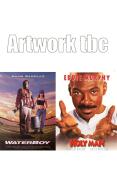 The Waterboy/Holy Man | DVD | (05/11/2007)
from £N/A
| Saving you £N/A (N/A%)
| RRP
The Waterboy/Holy Man | DVD | (05/11/2007)
from £N/A
| Saving you £N/A (N/A%)
| RRP The Waterboy: (Dir. Frank Coraci) (1998): Just an oddball mama's boy who grew up on a farm Bobby Boucher (Sandler) never wanted anything more than to quench the thirst of the dehydrated athletes who treat him like dirt! But when Coach Klein (Henry Winkler) makes the call that allows Bobby to finally stand up for himself it unleashes a torrent of bottled-up frustration and exposes a talent for defense that transforms him from a meek ""water distribution engineer"" to the hardest hitter ever to roam the athletic playing field!Hollywood's wild and zany funnyman Adam Sandler scores big laughs in a smash comedy hit where the laughs never run dry! Just an oddball mama's boy who grew up on a farm Bobby Boucher (Sandler) never wanted anything more than to quench the thirst of the dehydrated athletes who treat him like dirt! But when Coach Klein (Henry Winkler) makes the call that allows Bobby to finally stand up for himself it unleashes a torrent of bottled-up frustration and exposes a talent for defense that transforms him from a meek ""water distribution engineer"" to the hardest hitter ever to roam the athletic playing field! Holy Man: (Dir. Stephen Herek) (1998): A stressed out senior executive at the Good Buy home shopping channel Ricky Hayman (Goldblum) is praying for a miracle that will lift the network's lousy ratings and save his job. Then from out of nowhere ""G"" (Murphy) walks into his life! An outrageous self-styled inspiration guru with a knack for showing up where he isn't exactly wanted ""G"" proceeds to wander in front of the cameras just long enough to exude the irresistible star quality that will make him the sales-boosting saviour Ricky's network has been looking for!
![Legends Of The Fall [Blu-ray] [1994]](/pictures/1076946.jpg) Legends Of The Fall | Blu Ray | (05/11/2007)
from £N/A
| Saving you £N/A (N/A%)
| RRP
Legends Of The Fall | Blu Ray | (05/11/2007)
from £N/A
| Saving you £N/A (N/A%)
| RRP ![Moby Dick [1998]](/pictures/1080709.jpg) Moby Dick | DVD | (14/04/2008)
from £N/A
| Saving you £N/A (N/A%)
| RRP
Moby Dick | DVD | (14/04/2008)
from £N/A
| Saving you £N/A (N/A%)
| RRP Moby Dick
![Charlie Chaplin - Modern Times [1936]](/pictures/1012282.jpg) Charlie Chaplin - Modern Times | DVD | (01/06/2006)
from £N/A
| Saving you £N/A (N/A%)
| RRP
Charlie Chaplin - Modern Times | DVD | (01/06/2006)
from £N/A
| Saving you £N/A (N/A%)
| RRP Modern Times marks the last proper appearance of Charles Chaplin's iconic Little Tramp, and finds our hero struggling to make ends meet in the Depression of the 1930s. Along the way he takes up with a juvenile delinquent (actually 24-year-old Paulette Goddard) and plays a prison incident with "nose powder" for drug-induced laughs--both plot elements seeming quite innocent here, though both would provoke controversy today. Modern Times' most famous sequences portray the dehumanisation of factory labour to fine comic effect, balancing satire with slapstick to perfection in several superbly executed set-pieces. While the film has sound-effects and musical score, speech is only presented through mechanical means, via a gramophone, or through wall-sized TVs far more futuristic than in those in HG Wells' Things to Come (also 1936)--it's an interesting footnote that the comic and the SF visionary were friends. Chaplin famously not being a fan of sound cinema acknowledges the need to move with the times, yet hilariously spoofs the exploitation of man and machine while doing so. Amid some great laughs, the political message comes though clearly: the boss is making a fortune while doing jigsaw puzzles in his luxury office, the workers are toiling ever harder on the production line for their pittance. On the DVD: Modern Times is offered in the original 4:3 black and white with good mono sound evidencing just a little distortion and a very clean, clear picture with minimal grain to give away its age. Also included are French and Italian dubbed versions and a pointless and ineffective English Dolby Digital 5.1 version of the soundtrack. The disc features multiple subtitle options, including English for hard of hearing. Disc Two begins with a six-minute introduction by David Robinson. Next comes a very worthwhile 26-minute documentary by Philippe Truffault, Chaplin Today, centred around a perceptive subtitled discussion between French filmmakers Luc & Jean-Pierre Dardenne. There are three trailers, beautifully reproduced posters, an eight-part photo gallery and one entertaining deleted scene, as well as Chaplin's "nonsense song" from the film in isolated form and in a "Karaoke" version. The Documents section begins with a silent 42-minute 1931 documentary/propaganda film, In the Machine Age made by the US Dept of Labor. Along similar but more entertaining lines is Symphony in F a 1940 colour film combining music, manufacturing footage and animation celebrating the Ford motor company, while also included is a sequence from the Liberace Show (1956) with the star performing the vocal version of "Smile", the theme from Modern Times. Demonstrating the truly universal appeal of Chaplin is a 1967 short For the First Time, documenting what happens when the people of the remote Baracoa mountains in Cuba see their first ever movie, Modern Times. This is a remarkable collection which does a great film justice. --Gary S Dalkin
![The Grapes Of Wrath - Book & DVD [1940]](/pictures/1010958.jpg) The Grapes Of Wrath - Book & DVD | DVD | (08/08/2005)
from £27.99
| Saving you £-12.00 (N/A%)
| RRP
The Grapes Of Wrath - Book & DVD | DVD | (08/08/2005)
from £27.99
| Saving you £-12.00 (N/A%)
| RRP John Ford's memorable screen version of John Steinbeck's epic novel of the Great Depression--often regarded as the director's best film--stars Henry Fonda as Tom Joad. After having served a brief prison sentence for manslaughter Joad arrives at his family's Oklahoma farm only to find it abandoned. Muley (John Qualen) a neighbor now nearly mad with grief tells Tom of the drought that has transformed the farmland of Oklahoma into a desert and of the preying land agents who have plowed under the shacks of the sharecroppers. Joined by former hellfire preacher Casy (John Carradine) Tom finds his extended family including Pa (Charles Grapewin) and his indomitable Ma (Jane Darwell) packing their ramshackle truck to seek work in the fields of California. As the family treks across the country their dissolution begins with the deaths of Tom's grandparents at close intervals. When they arrive in California the Joads find only an abundance of poverty-stricken migrants like themselves and little in the way of potential work. Yet ever resilient they maintain their dignity hoping for the best. Among the talented cast Fonda does perhaps the best work of his career as does Qualen in the film's most haunting sequence. Director of photography Gregg Toland captures the suffering and the weathered luminous nobility of the Joads and the other uprooted drifting families creating striking images equal to the best work of Dorothea Lange and Walker Evans. In a stirring film that stands as a microcosm of the depression experience of millions Ford gives poverty a human face in a way that was rare then and even rarer in the decades to follow as Hollywood films with a sense of class consciousness dwindled like a species nearing extinction.
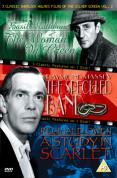 3 Classic Sherlock Holmes Films Of The Silver Screen - Vol. 2 | DVD | (04/09/2006)
from £4.03
| Saving you £0.96 (19.20%)
| RRP
3 Classic Sherlock Holmes Films Of The Silver Screen - Vol. 2 | DVD | (04/09/2006)
from £4.03
| Saving you £0.96 (19.20%)
| RRP Woman In Green (Dir. Roy William Neill 1945): Enter the master of detection as Scotland Yard are mystified by a quartet of horrifying crimes defying any logical explanation. The murder of four women is always going to create concern but when each victim is missing their right forefinger there is something more to the case than meets the eye. Holmes of course being a mind capable of penetrating the most evil of plots is eager to face the challenge and with the aid of his faithful companion Dr. Watson sets out in pursuit of the fiend or fiends. As the mystery unravels it is plain to see that this is no simple case of a murderer with a fetish but that of a very clever adversary in the shape of the accursed Professor Moriarty. The brilliant detective is facing a real threat as he is put into a trance with no doubt the same deadly outcome as the unfortunate souls whose untimely death he's trying to solve. The Speckled Band (Dir. Jack Raymond 1932): The legendary sleuth Sherlock Holmes (Raymond Massey in his screen debut) uncovers a sinister plot while in the midst of solving a girl's murder case based on her two dying words - ""Band"" and ""Speckled."" A Study in Scarlet (Dir. Edwin L. Marin 1933): When the body of a man is found in a house in London Holmes is called in to investigate some interesting clues; a woman's wedding ring and a timetable for the Atlantic Steamship Company.
![Wedding Crashers [2005]](/pictures/1035721.jpg) Wedding Crashers | DVD | (28/12/2005)
from £N/A
| Saving you £N/A (N/A%)
| RRP
Wedding Crashers | DVD | (28/12/2005)
from £N/A
| Saving you £N/A (N/A%)
| RRP With Vince Vaughn and Owen Wilson as a pair of brazen wedding crashers, this buddy/romantic comedy milks a few big laughs from its foolproof premise. Under the direction of David Dobkin, the movie ranges from bawdy romp to mushy romance, and that tonal identity crisis curtails the overall hilarity. But when the well-teamed costars are firing on all pistons with fast-paced dialogue and manic situations, belly laughs are delivered at a steady clip. Things get complicated when the guys infiltrate the family of the Treasury Secretary (Christopher Walken), resulting in a romantic pair-off between Vaughn and the congressman's oversexed daughter Gloria (Isla Fisher) while Wilson sincerely woos another daughter, Claire (Rachel McAdams), who's unhappily engaged to an Ivy League cheater (Bradley Cooper). Walken is more or less wasted in his role, but Jane Seymour and Henry Gibson make amusing appearances, and a surprise guest arrives late in the game for some over-the-top scene-stealing. It's all a bit uneven, but McAdams (considered by some to be "the next Julia Roberts") is a pure delight, and with enough laughs to make it easily recommended, Wedding Crashers will likely find its place on DVD shelves alongside other flawed but enjoyable R-rated comedies that embrace a naughtier, nastier brand of humor with no need for apologies. --Jeff Shannon, Amazon.com
![The Final Curtain [DVD] [2003]](/pictures/1100753.jpg) The Final Curtain | DVD | (04/08/2003)
from £N/A
| Saving you £N/A (N/A%)
| RRP
The Final Curtain | DVD | (04/08/2003)
from £N/A
| Saving you £N/A (N/A%)
| RRP ![Legends of the Fall/Steel Magnolias [DVD]](/pictures/1129832.jpg) Legends of the Fall/Steel Magnolias | DVD | (27/09/2004)
from £232.37
| Saving you £-223.38 (N/A%)
| RRP
Legends of the Fall/Steel Magnolias | DVD | (27/09/2004)
from £232.37
| Saving you £-223.38 (N/A%)
| RRP Legends Of The Fall: Colonel William Ludlow (Anthony Hopkins) built a ranch in the remote foothills of the Montana Rockies, raising his three sons away from the carnage of the Indian wars.
Alfred (Aidan Quinn), the eldest, is dutiful and reserved, Samuel (Henry Thomas), the beloved youngest, is compassionate and idealistic, and middle brother Tristan (Brad Pitt) has a wild and untameable spirit. Into this masculine world enters Susannah Finncannon (Julia Ormond), a beautiful, intellig...
![Sherlock Holmes - The Woman In Green / The Many Faces Of Sherlock Holmes [1944]](/pictures/1013242.jpg) Sherlock Holmes - The Woman In Green / The Many Faces Of Sherlock Holmes | DVD | (25/09/2006)
from £6.79
| Saving you £-0.80 (N/A%)
| RRP
Sherlock Holmes - The Woman In Green / The Many Faces Of Sherlock Holmes | DVD | (25/09/2006)
from £6.79
| Saving you £-0.80 (N/A%)
| RRP In 'The Woman in Green' Holmes and Watson must solve the greatest crime wave since Jack the Ripper. Based on the Conan Doyle short stories 'Adventures of the Empty House' and 'The Final Problem' this film marks the last screen appearance of Professor Moriarty in the Basil Rathbone series. A sequence of strange murders baffles the police. Holmes is called onto the scene and discovers the existence of a blackmail ring that uses a female hypnotist to further their skulduggery.
![Charlie Chaplin - Modern Times [1936]](/pictures/1012153.jpg) Charlie Chaplin - Modern Times | DVD | (17/11/2003)
from £N/A
| Saving you £N/A (N/A%)
| RRP
Charlie Chaplin - Modern Times | DVD | (17/11/2003)
from £N/A
| Saving you £N/A (N/A%)
| RRP Chaplin's last 'silent' film filled with sound effects was made when everyone else was making talkies. Charlie turns against modern society the machine age (the use of sound in films?) and progress. Firstly we see him frantically trying to keep up with a production line tightening bolts. He is selected for an experiment with an automatic feeding machine but various mishaps leads his boss to believe he has gone mad and Charlie is sent to a mental hospital... When he gets out he is mistaken for a communist while waving a red flag sent to jail foils a jailbreak and is let out again. We follow Charlie through many more escapades before the film is out.
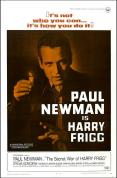 Secret War of Harry Frigg, the | DVD | (26/01/2009)
from £N/A
| Saving you £N/A (N/A%)
| RRP
Secret War of Harry Frigg, the | DVD | (26/01/2009)
from £N/A
| Saving you £N/A (N/A%)
| RRP Harry Frigg is a classic Paul Newman rebel - a private in the U.S. Army who is forever escaping from military prisons. Several Brigadier Generals from the Allied forces are unexpectedly taken prisoner by the Italians while in the shower - a public relations disaster. This is compounded by the fact that the Generals are being held inan Italian Villa and are unable to escape because being all of the same rank none is in command and they are forced to plan by committee with predictably ineffective results. Headquarters devises a plot to free these generals by sending in jail escape expert Harry Frigg...
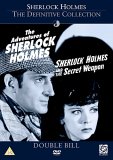 Sherlock Holmes - Adventures / The Secret Weapon | DVD | (12/03/2007)
from £4.83
| Saving you £9.42 (263.87%)
| RRP
Sherlock Holmes - Adventures / The Secret Weapon | DVD | (12/03/2007)
from £4.83
| Saving you £9.42 (263.87%)
| RRP ![Rich And Strange [1931]](/pictures/1038826.jpg) Rich And Strange | DVD | (28/02/2005)
from £N/A
| Saving you £N/A (N/A%)
| RRP
Rich And Strange | DVD | (28/02/2005)
from £N/A
| Saving you £N/A (N/A%)
| RRP Mixing silent film techniques with the new element of sound - only one-fifth of the film offers dialogue - Rich And Strange tells the charming story of Fred Hill (Henry Kendall) and his wife Emily (Joan Barry) a small-town British couple who inherit some money from a rich uncle and suddenly decide to take a world cruise. Both however find themselves out of their element and their attempts at extramarital adventures fail miserably. Their newfound sophistication havin
![Lucie Aubrac [1998]](/pictures/1005438.jpg) Lucie Aubrac | DVD | (28/06/2004)
from £7.99
| Saving you £12.00 (150.19%)
| RRP
Lucie Aubrac | DVD | (28/06/2004)
from £7.99
| Saving you £12.00 (150.19%)
| RRP In wartime France, Raymond Samuel is captured after attending a meeting of the Resistance. His wife Lucie goes to extraordinary lengths, at great personal risk, as she attempts to rescue him before he is executed...
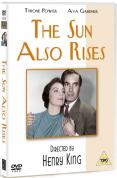 The Sun Also Rises | DVD | (28/08/2006)
from £N/A
| Saving you £N/A (N/A%)
| RRP
The Sun Also Rises | DVD | (28/08/2006)
from £N/A
| Saving you £N/A (N/A%)
| RRP Based on the novel by Ernest Hemingway and featuring a terrific cast of Hollywood greats The Sun Also Rises finally arrives on DVD. American news correspondent Jake Barnes (Tyrone Power) relocates to Paris after receiving serious injuries during WWI which have rendered him impotent. Barnes links up with several other lost souls including the lavicious Lady Brett Ashley (Ava Gardner) and drunkard Mike Campbell (Errol Flynn). In their search for new thrills Barnes and his coh
![12 Angry Men [Blu-ray]](/pictures/1121788.jpg) 12 Angry Men | Blu Ray | (03/06/2013)
from £7.99
| Saving you £N/A (N/A%)
| RRP
12 Angry Men | Blu Ray | (03/06/2013)
from £7.99
| Saving you £N/A (N/A%)
| RRP Henry Fonda Lee J. Cobb Ed Begley and Jack Klugman lead the distinctive cast of jurors whose character portrayals are perfect in every detail (The Hollywood Reporter). With its star-powered cast and three Oscar Nominations including Best Picture 12 Angry Men is a powerful suspenseful and fascinatingly entertaining film (Los Angeles Examiner). Eleven jurors are convinced that the defendant is guilty of murder. The twelfth has no doubt of his innocence. How can this one man steer the others toward the same conclusion? It's a case of seemingly overwhelming evidence against a teenager accused of killing his father in one of the best pictures ever made (The Hollywood Reporter). Special Features: Audio Commentary with Film Historian Drew Casper Beyond Reasonable Doubt: Making 12 Angry Men Inside the Jury Room Original Theatrical Trailer
![Ape, The / British Intelligence [1940]](/pictures/1011141.jpg) Ape, The / British Intelligence | DVD | (16/05/2005)
from £7.09
| Saving you £9.90 (139.63%)
| RRP
Ape, The / British Intelligence | DVD | (16/05/2005)
from £7.09
| Saving you £9.90 (139.63%)
| RRP This DVD bring together two films from 1940 starring horror icon Boris Karloff: Monogram Pictures' The Ape and the British Intelligence.Karloff plays one of his many mad scientists in The Ape directed by William Nigh who also helmed several of Karloff's Mr. Wong films. Curt Siodmak who wrote The Wolf Man and others for Universal gives Karloff plenty of fun dialogue. The crisp cinematography is by Harry Neumann who shot over 200 films covering everything from Buck Jones to
![Brain From Planet Arous, The / Teenage Monster / Space Cadet [1958]](/pictures/1012800.jpg) Brain From Planet Arous, The / Teenage Monster / Space Cadet | DVD | (01/09/2003)
from £N/A
| Saving you £N/A (N/A%)
| RRP
Brain From Planet Arous, The / Teenage Monster / Space Cadet | DVD | (01/09/2003)
from £N/A
| Saving you £N/A (N/A%)
| RRP You have to credit the folks who put this double bill together. The Brain from Planet Arous, a low-budget alien invasion 1958 film, is one of those programmes that lingers in the memory as much for its title and impressively ludicrous giant-staring-transparent-brain monster as for its poverty row dramatics, in which the usually stiff John Agar grins evilly and flashes contact lenses when possessed by the creature and a good guy brain shows up to take over his dog to thwart the renegade cerebrum's plan for world domination. For this release, Brain is teamed with its original co-feature, a movie so bad you wouldn't buy it on its own but whose presence here is a pleasing extra. Whereas Brain from Planet Arous delivers exactly what its title promises, Teenage Monster is a cheat: rather than feature a mutant 1950s delinquent in a leather jacket, it's a melodramatic Western in which prospector's widow Anne Gwynne keeps her hulking caveman-like son (who seems to be well into middle-age) hidden, only for a scheming waitress to use the goon in her murder schemes. Brain is snappily directed, even when staging disasters well beyond its budget, while Teenage Monster drags and chatters and moans until its flat finale. On the DVD: The Brain from Planet Arous/Teenage Monster double bill disc is a solid showing for such marginal items, featuring not only the trailers for these attractions but a clutch of other 1950s sci-fi pictures (Phantom from Space, Invaders from Mars, etc.) and a bonus episode ("The Runaway Asteroid") from a studio-bound, live-broadcast juvenile space opera of the early 50s (Tom Corbett, Space Cadet) in which hysterical types in a capsule break off from the space programme to deliver ringing endorsements of gruesome-looking breakfast foods. --Kim Newman

Please wait. Loading...
This site uses cookies.
More details in our privacy policy